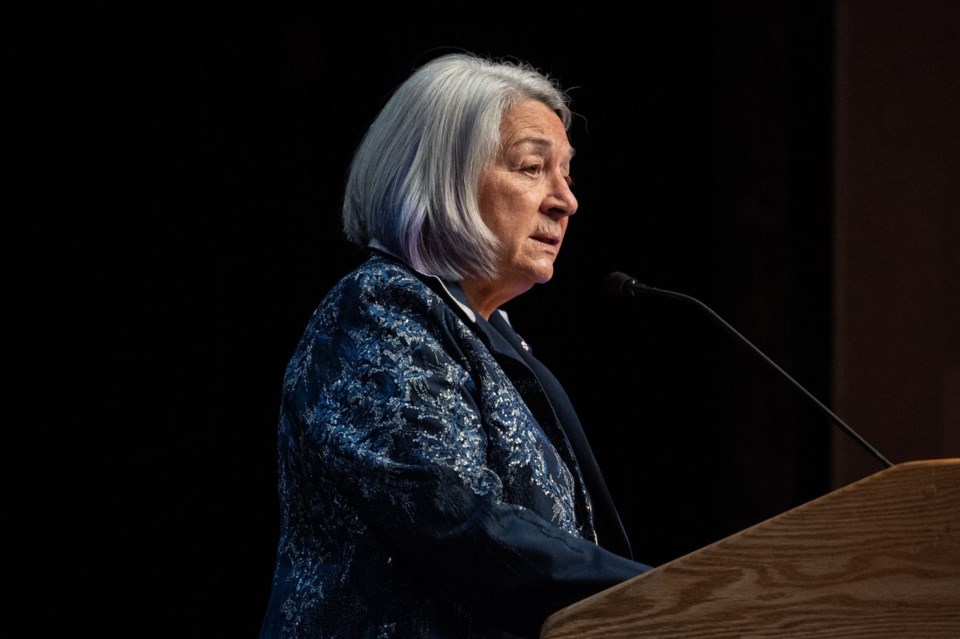Canadian Indigenous leaders bid farewell to “an ally and a friend” at the funeral of Pope Francis on Saturday, lauding the pontiff for advancing reconciliation efforts with a historic apology for injustices that remain raw for many.
Gov-Gen. Gen. Mary Simon and chiefs Wilton Littlechild, Phil Fontaine and Cindy Woodhouse Nepinak were among the thousands of dignitaries and Catholic faithful who filled St. Peter’s Square to honour Francis and his dedication to a myriad of issues, including concerns facing migrants, marginalized groups and the poor.
Afterwards, the head of the Assembly of First Nations remembered Francis for apologizing during his visit to Canada in July 2022 for the Catholic Church’s role in widespread abuses at residential schools.
"I stand with people around the world and in mourning the loss of an ally and a friend to First Nations, Pope Francis," National Chief Nepinak said by phone Saturday, reached on a busy Rome street hours after the mass.
“No other pope before him had done that, had done that work and had apologized, and so I thank him for his life."
Nepinak acknowledged a sad day in marking the pontiff’s death, but also a day for looking to the future, “knowing that we have to still build the relationships and change the conversation on some really difficult issues within the Catholic Church."
Simon, Canada's first Indigenous governor general, said the pontiff's apology for abuses in the residential school system was a significant step in addressing historical injustices.
"I hope that the new pope will carry on the work that Pope Francis was doing,” said Simon, who led the Canadian delegation to Rome.
"The apology was a significant milestone, and we have to continue working together on the journey of reconciliation. The fact that he came to Canada and apologized on Canadian lands, on Indigenous lands, was very significant."
Littlechild said it's important to continue that work for "our healing journeys."
Nepinak said she, Littlechild and Fontaine met with several Canadian cardinals after the funeral to informally discuss next steps in healing relations between the Church and Indigenous Peoples.
"We talked about some of the work that he had done in the past couple of years. So it was a good day that way, where I was able to build relations with Vatican officials and cardinals and bishops,” she said.
The road ahead is not smooth, she added, noting resistance remains among some in the Church and in Indigenous communities to both change and accepting the apology.
"I think it's very raw. And residential schools is just very, still, very raw for Canada."
The papal visit in July 2022 was described as a “penitential pilgrimage” because Pope Francis insisted on meeting with Indigenous survivors of residential schools and hearing their stories.
In Maskwacis, Alta., Francis begged for forgiveness and expressed shame for abuses committed by some members of the Church. In Nunavut, he met survivors who showcased traditional practices banned in residential schools, including dancing, drumming and throat singing.
While the visit was recognized as a milestone, some criticized Francis for not naming the crimes and abuses. Others called for action, such as the return of sacred artifacts held by the Vatican.
Nepinak said she saw signs of a possible renewed relationship with the Church, noting that when she arrived at the funeral, she initially took her place towards the back of a VIP section.
But then a Vatican official approached and pulled her closer to the front.
"I was sitting in the back row, and some of the Vatican officials came and got me, and they brought me up to the stage, closer to his coffin and with the dignitaries up top,” she said.
"I want to be hopeful."
Simon said it's important for the Vatican to continue efforts at reconciliation.
“It's a long process, but you see things moving forward. And I hope that will continue to happen."
About 150,000 Indigenous children were forced to attend residential schools, more than 60 per cent of which were run by the Catholic Church.
This report by The Canadian Press was first published April 26, 2025.
Nicole Thompson and Cassandra Szklarski, The Canadian Press




